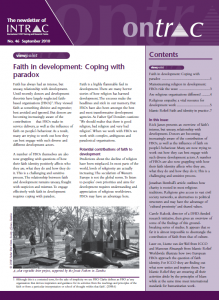 In this issue of ONTRAC Rick James presents an overview of faith’s intense, but uneasy, relationship with development. Donors are becoming increasingly aware of the contribution of FBOs, as well as the influence of faith on people’s behaviour. Many are now trying to work out how they can best engage with such diverse development actors. A number of FBOs are also now grappling with how their faith identity affects who they are, what they do and how they do it. This is a challenging and sensitive process.
In this issue of ONTRAC Rick James presents an overview of faith’s intense, but uneasy, relationship with development. Donors are becoming increasingly aware of the contribution of FBOs, as well as the influence of faith on people’s behaviour. Many are now trying to work out how they can best engage with such diverse development actors. A number of FBOs are also now grappling with how their faith identity affects who they are, what they do and how they do it. This is a challenging and sensitive process.
Jonathan Benthall’s article outlines how charity is rooted in most religious traditions. Religions give access to vast civil society networks, as alternatives to political structures and may have the advantage of ‘cultural proximity’ and shared values.
Carole Rakodi, director of a DFID-funded research initiative, then gives an overview of some of the findings of this groundbreaking series of studies. It appears that so far it is almost impossible to disentangle the contribution of faith from that of culture.
Later on, Lisette van der Wel from ICCO and Mamoun Abuarqub from Islamic Relief Worldwide illustrate how two European FBOs approach the question of faith identity. For ICCO they are finding out what now unites and inspires them. For Islamic Relief they are ensuring all their activities abide by the principles of Islam while at the same time meet international standards for humanitarian work.
Download:
ONTRAC 46. Faith in Development: Coping with Paradox
.pdf (0.97mb)
Download:
ONTRAC 46. Faith in Development: Coping with Paradox. Arabic
.pdf (0.40mb)
Download:
ONTRAC 46. Faith in Development: Coping with Paradox. French
.pdf (0.10mb)
Download:
ONTRAC 46. Faith in Development: Coping with Paradox. Portugese
.pdf (0.13mb)
Download:
ONTRAC 46. Faith in Development: Coping with Paradox. Russian
.pdf (0.46mb)
Download:
ONTRAC 46. Faith in Development: Coping with Paradox. Spanish
.pdf (0.12mb)